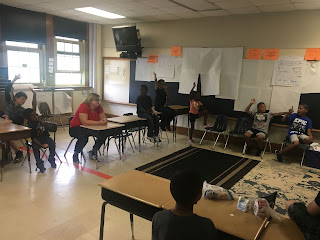Given the way we bicker over high stakes testing, the Common
Core, merit pay, and other educational reforms and policies, it may be hard to
believe that teachers, parents and policy makers all want the same things for
our children – positive outcomes. If we
all want our children to do well, why can’t we agree? The answer is that we
define “positive outcomes” in many different ways. In our increasingly test-driven educational
system, the policy makers have taken control of that definition. Positive outcomes has come to mean high test
scores on standardized exams. I remember
pushing my son to study for the SAT and re-take it until he got a number that
would become a golden ticket to admission to the right university and,
following graduation with another number (a GPA of 3.5 or higher), a successful
life. The focus on that number as an
indication of the value of a child’s education and his or her potential for a
successful life has filled our vision to the exclusion of all else. The child’s success, the teacher’s job and
salary, the fate of the school and the future of our nation have all been tied
to that number.
Imagine a child, number two pencil clutched in her hand,
prodded and prepped for this moment, carefully filling in circles that will determine
so many futures. She reads a passage
from Letter from Rifka describing a
girl, about her age, arriving in the U.S. from Russia. There is much that is compelling in this
passage – Rifka’s yearning to be reunited with her parents; her unexplained
baldness; the difficulties and delays on the journey; her first glimpse of Lady
Liberty, holding up her lamp – but, after reading this passage, the child is
asked three questions about basic facts (who is speaking, where is she
traveling from, what does she see first in NY harbor) and two vocabulary
questions (the meaning of “assist” and “clever”). How does this young girl read this
passage? Does she scan it for quick
answers to the factual questions? Slide
her finger over the text until she finds the word “assist” or “clever” and then
focus on that sentence alone? Let us say
that our young scholar gets all five questions right – is this the positive
outcome we were looking for? (This example comes from the California StandardsTest for 3rd grade.)
If this young girl were in the LEAP program, we would talk
about the similarities and differences between Rifka and herself. We would wonder what it would feel like to be
separated from ones parents by an ocean for a long period of time. We would ask if we could have endured the
journey. We would hypothesize about the
causes of Rifka’s baldness and wonder how it felt to see the Statue of Liberty
rising on the horizon, light shining from her uplifted hand. We would journal about these questions, write
our own letters about similar situations, act out scenes, talk about our
families and a hundred other things I can’t imagine at this moment because the
children would instigate them. Let us
imagine that the same young girl, in the LEAP program, wrote an imaginary
letter to a cousin about a trip she had taken.
Perhaps there would be some spelling errors – which we would note and
correct – but the importance of the writing would be to understand an important
time in U.S. history and connect it to our lives now. Is this the positive
outcome we are looking for?
I know many excellent teachers who strive for the same kinds
of outcomes that LEAP works for.
However, unlike LEAP, they must also prepare students for the kind of
exams that ask “Where is Rifka traveling from?” and the time they have to
pursue less easily measured gains is cut short.
Imagine also a parent listening in as a child moves his cars
around the floor, narrating the adventures imaginary people are having. “Oh no . . . the road is blocked! But “Crash!” in comes super truck, and the
obstacle is removed. “Thank you, thank
you!” squeals a high pitched voice, “now we can go to the store!” The deepest voice the child can muster
replies: “No problem! Glad to help.” And the parent grins, imagining a future for
her son – will he be in some helping profession like firefighter? Will he always be so polite and say “thank
you” and “glad to help”? Will he always
have a vibrant imagination, turning trucks into superheroes? And, please God, will he always be as happy as
he is in this moment? Are these the positive outcomes we are looking for? Do we teach or test them in our current
educational system?
Parents want the best for their children. We’ve been told that the best is a high score
on a standardized test. And there are
valuable things that children learn that can be measured that way. But the truly important things in life –
wonder, discovery, imagination, community – cannot be measured by a multiple
choice question. And we do want our
children to learn these things and they can be learned in school. I know that I experienced many of these
things in my own education (long before No Child was left behind and we all
started Racing to the Top).
Accountability for schools, teachers and children is not a bad thing –
but before we go any farther along this path, we have to ask, “accountable for what?”

No comments:
Post a Comment